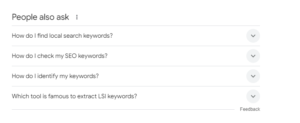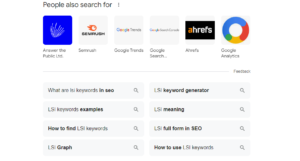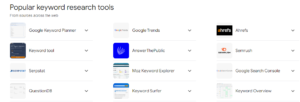If you are diving into the world of SEO, then you need to know about LSI keywords and how immensely they impact your content in search engines. According to the Search Engine Index report 2024, those websites that use LSI keywords saw a 30% increase in organic visibility. Also, they saw a 25% rise in organic traffic when integrated LSI keywords into their SEO practices.
Sounds interesting, right? These statistics could be of your website with skillfully working on keyword research strategy. Well, finding and then using it might be pretty daunting, but you don’t have to stress it out because, moving forward, you will understand what these are and how to find and implement them effortlessly.
What are LSI Keywords?
First things first—what are LSI keywords? So, LSI stands for Latent Semantic Index. If we break it down into simpler terms, these keywords are the other words that relate to your primary keyword. They set context and tell search engines just what your content is about. For example, using “birthday cake” as the main keyword, LSI keywords might include “eggless,” “pineapple,” or “diet cake.”
Think of it as the sidekick to your primary keyword. They provide added context to give real meaning, allowing search engines to understand the scope of your content.
How Do These Enhance Search Engine Understanding?
Search engines have come a long way from just matching simple keywords. They now use complex algorithms that understand the context and intent behind searches. Here, the LSI keyword generator plays a significant role. By using these related terms, you’re helping the search engines see the bigger picture.
For example, when writing about “digital marketing,” LSI keywords add more context, such as “SEO,” “content strategy,” and “PPC advertising,” that would help the search engine understand that you tried to cover most of the related subjects. This increases the chances of appearing in relevant search results. It will increase your ranking for several other related searches. This helps your content to be visible in search results for broader questions and associated terms, increasing its visibility and relevance.
For a comprehensive approach, don’t forget to include akeyword research checklist to refine your strategy further.
What are the Benefits of Using LSI Keywords for Your Business?
Now, why would you care about LSI keywords? In the world of various SEO practices, what LSI keywords add more? Well, here are the 3 leading advantages of using these keywords and enhancing your content performance:
More Relevant: These keywords ensure relevance to a broader range of related searches, driving more targeted traffic to your site.
Higher Rankings: Including a mix of related keyword terms will help ensure a higher rank for various other search queries. This will direct visitors to your website for more information.
Better User Experience: When your content addresses many fronts of a topic, this likely means it can fully answer your audience’s questions, hence longer time spent on your website page.
How to Find LSI Keywords?
Now that you’re convinced of the benefits, let’s find these golden keywords and create the best keyword research strategy. Searching for them is very easy. Here’s how:
Google Search Suggestions: Type in your main keyword at Google and see what they suggest. Quite often, these suggestions can be LSI keywords.

Related Searches: When you scroll to the bottom of Google’s search results page, you can find “related searches.” These can give you additional LSI keyword ideas.

Keyword Research Tools: When detecting LSI keywords, Google Keyword Planner, Ahrefs, LSI Graph, SerpStat and SEMrush are a great help. In all five, you must enter the major keywords and then keep your eyes on related terms or phrases that appear. For a deeper dive into keyword research, especially using Google Keyword Planner, you can read blog:how Google Keyword Planner works

Now you know how to find them in your content, let’s move on to know how to use them.
How to Effectively Use them in Your Content?
Now that you have your LSI keywords, how do you seamlessly weave them into the content? Including them in your content is like using usual keywords, but here are a few things you must keep in mind while optimizing your content for them.
Integrate Them Naturally: Use LSI keywords as part of the content, naturally flowing with the rest. Avoid forced insertion.
Optimize Titles and Meta Descriptions: You want to include your LSI keywords to make things relevant in titles and meta descriptions.
Enhance on-page SEO: Integrate these all over in headings, subheadings, and in the body, making sure they fit contextually.
By effectively incorporating these strategies into yourdigital marketing strategy, you can enhance your content’s visibility and relevance in search results.
Common Mistakes to Avoid
These can indeed prove to be game-changing for your search engine optimization efforts, but here are some common mistakes that you must avoid the following:
Keyword Stuffing: This is one of the biggest mistakes of overstuffing your content with LSI keywords. While it is essential to use these types of keywords to maximize relevance, if you stuff your content with them too many, the writing will sound mechanical, quite the opposite of desired readability. Adopt a delicate balance in the use of Latent Semantic Index keywords to retain natural flow.
Ignoring Quality of Content: Another major mistake is just focusing on the keyword research strategy and thus completely forgetting about the quality of your content. It is crucial that your content remains valuable and informative. Quality content will always be desirable since engaging and well-written material will keep readers interested and, therefore, more likely to share your content.
How to Analyze the Impact of LSI Keywords?
To witness the potency of your LSI keywords at work, you will have to measure their impact through the right tools and strategies. Here’s how you can do it:
Monitor Traffic: Using tools like Google Analytics can enable you to track traffic changes and help you determine if your keyword research strategy is driving more visitors to your website. It shall help learn the trends of traffic and understand how effectively one’s LSI Keywords work.
Track Rankings: Get a constant update on your search rankings for both primary and LSI keywords to see how well your improvement in keyword research strategies is paying off in terms of positions on the search engine.
Check Engagement: This would include checking details of user metrics for engagement, such as time on the page and bounce rate on Google Analytics. It would tell if the visitors found the content relevant or interesting. It is very important feedback since this determines how successful the implementation of your keywords has been.
3 Bonus Tips for Using LSI Keywords to Boost Your SEO
If used in the right way, LSI keywords can help you get the best of your SEO strategy. They can help attract relevant traffic to your site. Here are some bonus tips on how to maximize the impact of these keywords:
Add LSI Keywords in Internal Links: Use these keywords inside an internal linking strategy. That’s not only good for SEO when linking to other pages with relevant LSI keywords, but it also creates a much better user experience with more value delivered to the reader.
Go for Voice Search Optimization: Since voice search is increasingly in use, think of how people phrase their queries verbally. Add LSI keywords matching these conversational phrasing to rank on voice search results.
Stay Updated: The world of SEO trends and algorithms is changing fast. Keep your eye on industry changes to make sure that your keyword research strategy includes LSI keywords—and continues to be practical and relevant with the times according to current best practices.
Conclusion
Overall, these are among the best practices that can be added to any SEO strategy. Know what they are for, and efficiently and rightly discover them by employing an LSI keyword generator tool such as Google Keyword Planner, LSI Graph, Ahrefs, SEMrush, etc. Use them wisely to increase your relevance and SERPs rank for any content. Are you ready to start using these keywords to lift your SEO to new heights? So, what strategy are you going to use to optimize your content for these keywords? Tell us in the comments below. If you need further assistance or professional digital marketing services, feel free to contact us!




